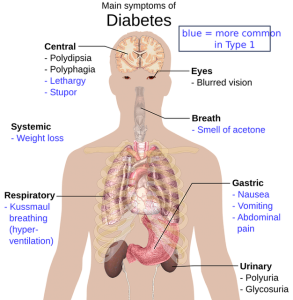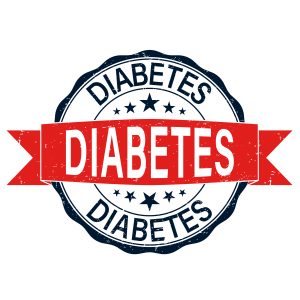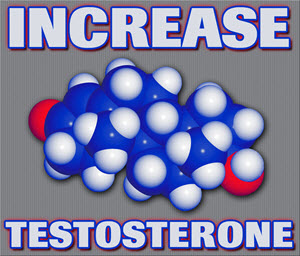Video Link: https://vimeo.com/293253107
Video Download: Click Here To Download Video
Video Stream: Click Here To Stream Video
 Type-2 Diabetes is one of the most prevalent medical conditions in American society today, as well as one of the most dangerous.
Type-2 Diabetes is one of the most prevalent medical conditions in American society today, as well as one of the most dangerous.
Type-2 Diabetes is caused when lifestyle factors inhibit the body's ability to utilize insulin, which is responsible for the transport and utilization of glucose, the body's primary energy source.
There are many factors that increase the risk of Diabetes, but the most powerful and direct cause of diabetes is the overconsumption of simple carbohydrates such as sugar and processed grains.
As a result of the dangers of Type-2 Diabetes, which wreaks havoc on the cardiovascular system, tens of millions of dollars are pumped into Diabetes research each year.
Another factor that contributes to diabetes is obesity. This is unsurprising, considering that people that are overweight are more likely to consume the foods that lead to diabetes, and are more likely to consume them in great abundance.
A recent study suggests that, among patients that are obese, suffering from Low-T, and currently suffering from Type-2 diabetes, Bio-Identical Testosterone Treatments can improve health outcomes for patients.
Testosterone Study Provides Insight into the Link between Low-T and Diabetes
This study was recently released in the periodical, the European Journal of Medical Research. In this study, eighty-five participants were chosen, all of which were overweight, with a body mass between 27 and 48 kilograms per meter squared, male, and diabetic.
All of these patients were put on a unique health regimen to improve their health. Half of the patients were provided Low-T Treatment in combination with exercise and nutrition control, while the others received the same exceptional care, but received placebo rather than Testosterone Treatment.
This course of treatment was provided for a total of six months, after which, the groups were evaluated for changes in their health status.
One distinct difference between the two groups was related to cholesterol. Among patients on placebo, the prescribed health regimen did not lead to significant benefits concerning  cholesterol levels, whereas patients using Testosterone in combination with this regimen experienced substantial improvement in cholesterol balance.
cholesterol levels, whereas patients using Testosterone in combination with this regimen experienced substantial improvement in cholesterol balance.
In addition to this, HbA1c levels were also impacted by the use of Testosterone Therapy.
Both placebo and experimental groups experienced worthwhile changes in their HbA1c levels, but patients taking Testosterone underwent even more significant improvement.
Other benefits afforded by Testosterone Therapy included healthier leptin levels, blood pressure, and Body Mass Index, as compared to placebo, which provided some benefit, but not as significant as that of Bio-Identical Testosterone Therapy.
In the conclusion of the research article, the authors claim that the research clearly shows that Low-T Treatment can improve the body's ability to control blood sugar and increases the strength of Insulin to perform its necessary duties to sustain and bolster health effectively.
The researchers associated with this critical Testosterone Diabetes Study are all scientists working in the country of Georgia at the National Institute of Endocrinology.
Testosterone Replacement Hypothesized to Mitigate the Effects of Diabetes
The goal of this study was not to flood the body with excess Testosterone but to bolster Testosterone Levels to those associated with younger, healthier males.
Study after study continues to bear out the fact that Testosterone Therapy has immense benefits for patients suffering from Testosterone Deficiency.
The human body is designed to operate in peak condition when there is a certain amount of Testosterone circulating through the body and inhibited Testosterone Levels clearly contribute to health issues ranging from atherosclerosis to Alzheimer's to both Type-1 and Type-2 Diabetes.
Testosterone Therapy Diabetes Study Results
- Testosterone Diabetes LDL – LDL Cholesterol Levels dropped from 103.0 down to 95.6.
- Testosterone Diabetes HDL – HDL Cholesterol Levels rose from 55.5 to 71.1.
- Testosterone Diabetes Triglycerides – Triglyceride Levels dropped slightly from 185.6 down to 178.3
- Testosterone Diabetes Leptin -Leptin Levels in the bloodstream fell from 21.7 to 11.6.
- Testosterone Diabetes HbA1c – Hemoglobin concentrations in the bloodstream dropped from 8.3 down to 7.5.
- Testosterone Diabetes BMI – In this study, six months of Testosterone Therapy with lifestyle counseling led to a drop in BMI from 35.7 down to 29.7.
As you can see, the combination of nutrition counseling , physical activity, and Testosterone Therapy can have truly life-changing health effects for patients with Type-2 Diabetes.
, physical activity, and Testosterone Therapy can have truly life-changing health effects for patients with Type-2 Diabetes.
The authors discuss the fact that the structure of this study is based primarily on three issues among patients with Type-2 Diabetes and Testosterone Deficiency:
- Patients that have diabetes have significantly increased odds of experiencing cardiovascular disease. When too much sugar is in the bloodstream, it is literally toxic and degrades the health of the entire system, including the heart.
- Research has also shown that patients with Low-T are much more likely to experience cardiovascular disease. Studies have shown that Testosterone has a protective effect upon the heart and cardiovascular system, and when Testosterone Levels fall, this directly leads to an increased risk of cardiovascular issues.
- Men that have diabetes are much more likely to experience significant Testosterone Deficiency than men that do not have Diabetes. Obesity and high blood sugar are both factors that suppress the body's ability to make Testosterone and/or maintain healthy Testosterone Levels in the bloodstream.
This study was designed to explore further the consequences of these three factors which have been extensively observed in scientific research.
In the end, the data and the conclusions derived from the data show that Testosterone Therapy can improve heart-health outcomes for patients with Diabetes and Testosterone Deficiency.
People with Type-2 Diabetes are stuck in a negative feedback loop that severely puts their health in danger. Issues related to Diabetes drive Testosterone Levels down in the bloodstream which prevents Testosterone from providing its immense benefits.
This directly leads to more severe problems and a more significant breakdown of physiological health which impairs Testosterone Production further.
Future Testosterone-Diabetes Study Could Provide More Insight into the Benefits of Testosterone
The researchers admit that, while this study was large enough to provide significant conclusions, more extensive, more extended studies will have to be performed to more accurately assess the benefits of Testosterone Treatment, as well as provide stronger data in support of these preliminary claims.
more accurately assess the benefits of Testosterone Treatment, as well as provide stronger data in support of these preliminary claims.
Diabetes is a metabolic disorder, and the results of this Diabetes Testosterone study show that it is possible to impede the progression of Diabetes through the intervention of Testosterone Replacement.
Other studies have been conducted in recent months and years which have explored the link between Testosterone and Diabetes.
In one particular study in the state of New York, Diabetic Patients on Low-T Treatment were found to respond to Insulin more readily, leading to a thirty percent boost in the utilization of glucose, while also providing many other benefits, similar to those produced in the Georgian study.
The jury is still ultimately out at this point, as other studies have shown no strong link between the use of Testosterone Patches, Creams, Gels, and Injections for Diabetes, including a study released in the country of Australia.
Reference
Could testosterone therapy benefit men with type 2 diabetes?
Contact Us Today For A Free Consultation

- BioSante Pharmaceuticals, Inc. to Present at BIO Investor Forum [Last Updated On: March 16th, 2025] [Originally Added On: October 9th, 2012]
- Secondary osteoporosis: More than what meets the eye! [Last Updated On: March 16th, 2025] [Originally Added On: October 10th, 2012]
- Trimel Provides Clinical and Operational Update [Last Updated On: March 16th, 2025] [Originally Added On: October 15th, 2012]
- Obese teen boys likelier to become impotent and infertile adults [Last Updated On: March 16th, 2025] [Originally Added On: October 17th, 2012]
- Obese teen boys have up to 50 percent less testosterone than lean boys [Last Updated On: March 16th, 2025] [Originally Added On: October 17th, 2012]
- Trimel Reports Physician Market Research Results for CompleoTRT(TM) [Last Updated On: March 16th, 2025] [Originally Added On: October 24th, 2012]
- Obese teen boys likelier to turn into 'impotent' men [Last Updated On: March 16th, 2025] [Originally Added On: October 24th, 2012]
- Trimel Pharmaceuticals Corporation to Report Third Quarter 2012 Results and Host a Conference Call to Update Investors [Last Updated On: March 16th, 2025] [Originally Added On: November 2nd, 2012]
- Peer Exchange: Establishing Bone Health Clinics - Video [Last Updated On: March 16th, 2025] [Originally Added On: November 2nd, 2012]
- What is hypogonadism and how does it affect fertility? - Video [Last Updated On: March 16th, 2025] [Originally Added On: November 2nd, 2012]
- Low Testosterone in Men or Man-O-Pause - Video [Last Updated On: March 16th, 2025] [Originally Added On: November 2nd, 2012]
- Propecia (Finasteride) -- Undisclosed Mechanisms, Potential Dangers [Last Updated On: March 16th, 2025] [Originally Added On: November 2nd, 2012]
- How to Get Ripped - Why You Shouldnt Use Anabolic Steroids - Video [Last Updated On: March 16th, 2025] [Originally Added On: November 2nd, 2012]
- Future Doc: Andropause Alternatives with Dr. James Biddle Part 1 - Video [Last Updated On: March 16th, 2025] [Originally Added On: November 2nd, 2012]
- Increase Testosterone Naturally With these Diet And Workout Secrets - Video [Last Updated On: March 16th, 2025] [Originally Added On: November 2nd, 2012]
- Sector Update: Healthcare - Video [Last Updated On: March 16th, 2025] [Originally Added On: November 2nd, 2012]
- Signs And Symptoms of Hypogonadism [Last Updated On: March 16th, 2025] [Originally Added On: November 2nd, 2012]
- Auxilium and Pfizer Will Conclude Agreement on XIAPEX® EU Collaboration [Last Updated On: March 16th, 2025] [Originally Added On: November 9th, 2012]
- Repros Therapeutics Inc.(R) Reports Third Quarter 2012 Financial Results [Last Updated On: March 16th, 2025] [Originally Added On: November 14th, 2012]
- hypogonadotropic hypogonadism - Video [Last Updated On: March 16th, 2025] [Originally Added On: November 22nd, 2012]
- Research and Markets: Male Hypogonadism - Pipeline Review, H2 2012 [Last Updated On: March 16th, 2025] [Originally Added On: November 30th, 2012]
- Auxilium Pharmaceuticals, Inc. to Present At The Oppenheimer 23rd Annual Growth Conference [Last Updated On: March 16th, 2025] [Originally Added On: December 8th, 2012]
- Low Testosterone (Hypogonadism) - Part 2 - Video [Last Updated On: March 16th, 2025] [Originally Added On: December 10th, 2012]
- The National Mesothelioma Law Firm of Baron and Budd Reports on a New Drug that Could Improve the Health of ... [Last Updated On: March 16th, 2025] [Originally Added On: December 19th, 2012]
- Hypogonadism ¦ Treatment and Symptoms - Video [Last Updated On: March 16th, 2025] [Originally Added On: March 7th, 2013]
- Research and Markets: Male Hypogonadism Global Clinical Trials Review, H1, 2013 [Last Updated On: March 16th, 2025] [Originally Added On: May 1st, 2013]
- Male hypogonadism Prof Ossama Fouda - Video [Last Updated On: March 16th, 2025] [Originally Added On: May 9th, 2013]
- Low Testosterone (Hypogonadism) - Part 3 - Video [Last Updated On: March 16th, 2025] [Originally Added On: July 2nd, 2013]
- Hypogonadism - what should you do - Video [Last Updated On: March 16th, 2025] [Originally Added On: July 2nd, 2013]
- NURS805 Hypogonadism Lecture - Video [Last Updated On: March 16th, 2025] [Originally Added On: August 16th, 2013]
- Hypogonadism: MedlinePlus Medical Encyclopedia [Last Updated On: March 16th, 2025] [Originally Added On: November 3rd, 2013]
- Hypogonadism - Diseases & Conditions - Medscape Reference [Last Updated On: March 16th, 2025] [Originally Added On: November 10th, 2013]
- Hypogonadotropic hypogonadism - Wikipedia, the free encyclopedia [Last Updated On: March 16th, 2025] [Originally Added On: November 10th, 2013]
- Low Testosterone (Low-T) Normal Levels, Hypogonadism, Symptoms ... [Last Updated On: March 16th, 2025] [Originally Added On: November 15th, 2013]
- HYPOGONADISM - University of Dundee [Last Updated On: March 16th, 2025] [Originally Added On: November 23rd, 2013]
- FAQ - Hypogonadism - MEDICAL DIAGNOSIS AND MEDICINAL PLANTS [Last Updated On: March 16th, 2025] [Originally Added On: November 23rd, 2013]
- Hypogonadism - About.com Men's Health [Last Updated On: March 16th, 2025] [Originally Added On: December 2nd, 2013]
- Exciting medical advances using HRT [Last Updated On: March 16th, 2025] [Originally Added On: December 12th, 2013]
- Male hypogonadism: Symptoms - MayoClinic.com [Last Updated On: March 16th, 2025] [Originally Added On: December 12th, 2013]
- Audio-Digest Foundation Announces the Release of Oncology Volume 04, Issue 16: Highlights from Future Directions ... [Last Updated On: March 16th, 2025] [Originally Added On: December 15th, 2013]
- Hypogonadism - Medscape Reference [Last Updated On: March 16th, 2025] [Originally Added On: December 21st, 2013]
- Hypogonadism [Last Updated On: March 16th, 2025] [Originally Added On: December 23rd, 2013]
- Hypogonadism - HealthCentral [Last Updated On: March 16th, 2025] [Originally Added On: December 24th, 2013]
- Hypogonadism | Medscape - Latest Medical News, Clinical Trials ... [Last Updated On: March 16th, 2025] [Originally Added On: December 30th, 2013]
- Hypogonadism - SharedJourney [Last Updated On: March 16th, 2025] [Originally Added On: January 23rd, 2014]
- Study Finds Potential Heart Risks from Testosterone Therapy [Last Updated On: March 16th, 2025] [Originally Added On: February 3rd, 2014]
- Endocrine Society calls for large-scale studies to evaluate testosterone therapy risks [Last Updated On: March 16th, 2025] [Originally Added On: February 8th, 2014]
- Testosterone Therapy Not Always Good for Older Men [Last Updated On: March 16th, 2025] [Originally Added On: February 11th, 2014]
- Hypogonadism: Types, Causes, & Symptoms Healthline [Last Updated On: March 16th, 2025] [Originally Added On: February 14th, 2014]
- Low Testosterone (Hypogonadism) in Men - Video [Last Updated On: March 16th, 2025] [Originally Added On: February 14th, 2014]
- Hypogonadism : Types, Causes, & Symptoms - Healthline [Last Updated On: March 16th, 2025] [Originally Added On: February 17th, 2014]
- Hypogonadism | Medscape - Latest Medical News, Clinical ... [Last Updated On: March 16th, 2025] [Originally Added On: February 23rd, 2014]
- Endo: FDA Oks AVEED Injection For Treatment Of Adult Men With Hypogonadism [Last Updated On: March 16th, 2025] [Originally Added On: March 6th, 2014]
- Unit Project 1 Hypogonadotropic hypogonadism - Video [Last Updated On: March 16th, 2025] [Originally Added On: March 8th, 2014]
- Update on Endo's Product Portfolio - Analyst Blog [Last Updated On: March 16th, 2025] [Originally Added On: March 11th, 2014]
- Male hypogonadism Symptoms - Diseases and Conditions ... [Last Updated On: March 16th, 2025] [Originally Added On: April 2nd, 2014]
- Hypogonadism: Types, Causes, & Symptoms - Medical ... [Last Updated On: March 16th, 2025] [Originally Added On: April 6th, 2014]
- VLog #127 Frances Explains Hypogonadism. - Video [Last Updated On: March 16th, 2025] [Originally Added On: April 7th, 2014]
- Repros Completes Enrollment for Androxal Study - Analyst Blog [Last Updated On: March 16th, 2025] [Originally Added On: April 16th, 2014]
- Prevalence, Diagnosis and Treatment of Hypogonadism in ... [Last Updated On: March 16th, 2025] [Originally Added On: April 30th, 2014]
- Repros Therapeutics Q2 Loss a Penny Wider than Expected - Analyst Blog [Last Updated On: March 16th, 2025] [Originally Added On: August 12th, 2014]
- Repros Reports Encouraging Late-Stage Data on Androxal - Analyst Blog [Last Updated On: March 16th, 2025] [Originally Added On: August 28th, 2014]
- Repros Therapeutics Analyst Brief Report; Androxal(R) Achieves Superiority in Top Line Analysis by Small Cap Street ... [Last Updated On: March 16th, 2025] [Originally Added On: September 30th, 2014]
- The Wall Street Journal: Repros Therapeutics shares drop on drug application setback [Last Updated On: March 16th, 2025] [Originally Added On: October 18th, 2014]
- Apricus expands development pipeline with in-licensing of US rights for fispemifene [Last Updated On: March 16th, 2025] [Originally Added On: October 21st, 2014]
- Apricus expands development pipeline with the in-licensing of US rights for fispemifene, a phase 2b ready asset, from ... [Last Updated On: March 16th, 2025] [Originally Added On: October 21st, 2014]
- Hypogonadism No Moustache! No Beard!! [Last Updated On: March 16th, 2025] [Originally Added On: October 28th, 2014]
- Male Hypogonadism: Male Reproductive Endocrinology: Merck ... [Last Updated On: March 16th, 2025] [Originally Added On: October 28th, 2014]
- Hypogonadism Wikipedia [Last Updated On: March 16th, 2025] [Originally Added On: October 28th, 2014]
- Urology Care Foundation - Urology A-Z - Low Testosterone [Last Updated On: March 16th, 2025] [Originally Added On: November 3rd, 2014]
- Will Repros (RPRX) Miss Estimates This Earnings Season? - Analyst Blog [Last Updated On: March 16th, 2025] [Originally Added On: November 5th, 2014]
- Hypogonadism in men living with HIV - Video [Last Updated On: March 16th, 2025] [Originally Added On: November 7th, 2014]
- Male Hypogonadism Therapeutic Pipeline Industry Review, H2 2014 - Video [Last Updated On: March 16th, 2025] [Originally Added On: November 7th, 2014]
- Testosterone Deficiency (Hypogonadism) Overview ... [Last Updated On: March 16th, 2025] [Originally Added On: November 23rd, 2014]
- Endo to Acquire Rights to Testosterone Nasal Gel Natesto - Analyst Blog [Last Updated On: March 16th, 2025] [Originally Added On: November 26th, 2014]
- Male hypogonadism pathophysiology - Video [Last Updated On: March 16th, 2025] [Originally Added On: January 14th, 2015]
- Auxilium Announces Results from Special Meeting of Stockholders [Last Updated On: March 16th, 2025] [Originally Added On: January 28th, 2015]
- What is Hypogonadism - Symptoms and Treatment | Hormone ... [Last Updated On: March 16th, 2025] [Originally Added On: January 30th, 2015]
- Male Hypogonadism 1/28/15 - Video [Last Updated On: March 16th, 2025] [Originally Added On: January 31st, 2015]
- Male hypogonadism: symptoms, cause, treatment, risk ... [Last Updated On: March 16th, 2025] [Originally Added On: February 18th, 2015]
Word Count: 1155





















